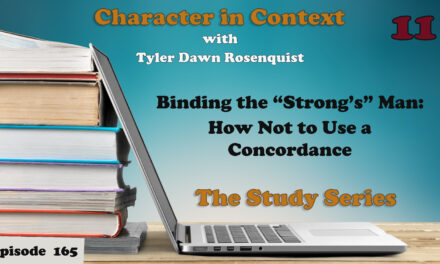This is the most important book I have ever read about Christian masculinity:
(My affiliate links for Amazon products are included in the post. As an Amazon Associate, I earn from qualifying purchases.)
“Being a man is not dependent on what one does; rather, a man is a man because he is made in the image of God. That’s it. Focusing masculinity on what a man does makes it something to be proved. Masculinity does not need to be proved; it needs to be affirmed. My fear is that this effort to challenge men to find the “wild man” has not produced the intended result. Rather than encouraging all men, it encouraged some men while emasculating and alienating others. In order for all men to be encouraged, a broader understanding of masculinity must be embraced — one that is found not in man himself but in the God in whose image he is created. It must not be separate from femininity, nor should it be positioned as superior to femininity. Rather, a true understanding of masculinity will be one that recognizes the complementary nature of the masculine and the feminine as reflections of the God from whom these characteristics derive their expression.”
“It is time to stop defining masculinity by what men do and start defining it by who men are. It is time to stop pushing men to fulfill a role and start focusing on helping men become human. Rather than focusing on making men breadwinners, warriors, or even better husbands, it is time to focus on encouraging men to be fully human and fully alive. If men can learn to be courageous — and not a “run into a burning house” courageous but a “be authentic about who you are” courageous — then men will be better husbands, better fathers, better coworkers, better neighbors, better friends. Better humans. Embodying characteristics such as vulnerability, integrity, gentleness, and courage will serve men far better in a changing world than forcing them to accept some predetermined role. Perhaps if we embrace the idea that there are many ways to be a man, men might be free.”
“Very few men will say, “I want to be known as a lamb.” But what does it say that Jesus was willing to be seen as a lamb? It seems he is redefining not only masculinity but strength as well. Jesus reveals that what we think is weak is actually strong. If we were to define masculinity by this Jesus, we would have to admit that masculine strength is not the ability to defeat one’s enemies with a show of raw power, but masculine strength that imitates the actions of Jesus is the willingness to lay down one’s life for another — including for the lives of one’s enemies. In a culture where men defend their honor, where they do not display weakness, where they are told to “grow some balls” the actions of Jesus are ludicrous. We’re not supposed to back down from our enemies. We don’t let them walk over us. We don’t go down without a fight. But Jesus inverts all of that and shows us that the way we’re to fight evil is not with fists but with outstretched arms of love. How different might masculinity look if it were modeled after the Lamb who was slain?”
“When we examine masculinity in light of Jesus, and particularly in light of the crucifixion, we see a masculinity that is willing to look weak, willing to be mocked, willing to be humiliated, and willing to be emasculated. This is one reason Paul said that preaching Christ crucified was “foolishness to Gentiles.” How could Jesus be a great man when he so clearly failed as a man according to the ideals of his day? How could he be all-powerful and yet be so clearly weak? Paul answers this way: “The foolishness of God is wiser than human wisdom, and the weakness of God is stronger than human strength.” Paul helps us see that in the kingdom of God, being powerless, tender, and vulnerable is not a sign of weakness but is paradoxically a prerequisite of strength.”
“When men fail to do the courageous work of admitting their limits, they too often turn into either shallow men who still believe their manhood is dependent on material success or bitter men who are looking for someone to blame for their failures. They are still running on the treadmill of trying to prove themselves, hoping to gain just a little ground. Insecure men, because of their failures, will be driven by a compulsion to make themselves appear superior to those around them, bolstering their bruised egos through racism, nationalism, sexism, and countless other -isms. Even religion becomes a means of superiority over others.”
“If we rediscover a costly, sacrificial discipleship that calls men to die and then initiates them into new life in Christ, we will see a resurgence of men in the church. Not chest-thumping, macho men, but men who are confident, vulnerable, teachable, humble, active in the world, and gentle with those around them. Men who are unafraid of conflict and resolute in their ways because they have laid down their desire to prove themselves, died to their natural inclinations, and risen united with Christ. Men who have heard the voice spoken over them: “You are an adopted son. You are man enough.”
It’s been ten days since I finished the book Man Enough: How Jesus Redefined Manhood (affiliate link) by Nate Pyle and I have to admit that it was one of the most profoundly moving and challenging experiences of my life. As a Bible teacher, woman, wife of thirty-one years, and the mother of two adult men I have had to seriously re-evaluate how I have contributed to the Catch-22 difficulties men face in conservative Western society and even more so in Western Christianity where men are repeatedly inundated with messages of what kind of man they are required to be in order to truly be “man enough” or “masculine enough” to represent Christ and the Church. And the most shocking thing to me was that although I have been teaching for many years how the Sermon on the Mount and the fruit of the Spirit would have looked feminine and wimpy during the first century, it had never occurred to me how stressful it is for men to live within this unbiblical space, effectively and cruelly wedged between the church and culture on one side and the Bible on the other. And I never saw how I was contributing to the problem when I was pushing cultural (as opposed to Biblical) hardline gender roles on men a decade ago.
Imagine being told to be meek, humble, forgiving, gentle, self-controlled, peaceful, loving, kind, non-violent, etc. in the Bible and then being told in popular Christian men’s conferences and books that if you obey these hard directives then you aren’t really a man? That Mister Rogers was a wimp instead of our best modern cultural example of what a Christian man should be in every way that counts? We are a church that has effectively told men that having a penis doesn’t really make them a man–despite using that same argument to prove that transgenders are still men. What’s up church? It’s a very convenient argument when we want to use it, and always to the detriment of the man it is aimed at.
Is the quiet man in the corner reading books, composing poetry, or playing the flute man enough? Is he a real man? Yeah, he is. Is the unmuscular man with fairer features than most also man enough? Absolutely. Is the man who hikes, hunts, fishes, does martial arts, works out, or goes to war more manly than men who don’t? Not a chance. God not only created man but created many different types of men–and most of them don’t look anything like the Avengers, Grizzly Adams, or Mr Universe. Honestly, over the last century, we have really entered into an alliance with the world in forcing a template onto men that very few can measure up to and none should be expected to. Men and women have collectively bullied both men and women based on external expectations that have nothing to do with morality or mature fruit and often stand as a direct contradiction to who and what we are individually called to as unique believers.
Romance novels, Hollywood movies, and High School locker rooms are the wrong places to learn about what makes a man a man. And they are even worse places for Christians to draw their expectations from. We need to give men a break and allow them to be the types of men whom God uniquely created–image-bearers of Himself, who is without physical appearance because He is spirit. It has never been about externals and sports and hobbies–it’s been about being good. A goodness that often stands at odds with what our society values and expects of a “real man.”
Really, it is just the same High School bullying we grew up with, benefitting and crushing the exact same groups. Nothing holy, righteous, or mature about it–just one more facet of friendship with the world.
All Quotes from:
Pyle, Nate Man Enough: How Jesus Redefined Masculinity, Zondervan, 2015




















